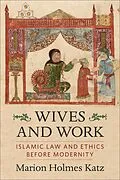It is widely held today that classical Islamic law frees wives from any obligation to do housework. Wives' purported exemption from domestic labor became a talking point among Muslims responding to Orientalist stereotypes of the "oppressed Muslim woman" by the late nineteenth century, and it has been a prominent motif in writings by Muslim feminists in the United States since the 1980s.
In Wives and Work, Marion Holmes Katz offers a new account of debates on wives' domestic labor that recasts the historical relationship between Islamic law and ethics. She reconstructs a complex discussion among Sunni legal scholars of the ninth to fourteenth centuries CE and examines its wide-ranging implications. As early as the ninth century, the prevalent doctrine that wives had no legal duty to do housework stood in conflict with what most scholars understood to be morally and religiously right. Scholars' efforts to resolve this tension ranged widely, from drawing a clear distinction between legal claims and ethical ideals to seeking a synthesis of the two. Katz positions legal discussion within a larger landscape of Islamic normative discourse, emphasizing how legal models diverge from, but can sometimes be informed by, philosophical ethics. Through the lens of wives' domestic labor, this book sheds new light on notions of family, labor, and gendered personhood as well as the interplay between legal and ethical doctrines in Islamic thought.
Autorentext
Marion Holmes Katz
Klappentext
It is widely held today that classical Islamic law denies that wives have any obligation to do housework. Wives' purported exemption from domestic labor became a talking point among Muslims responding to Orientalist stereotypes of the "oppressed Muslim woman" by the late nineteenth century, and it has been a prominent motif in writings by Muslim feminists in the United States since the 1980s.
In Wives and Work, Marion Holmes Katz offers a new account of debates on wives' domestic labor that recasts the historical relationship between Islamic law and ethics. She reconstructs a complex discussion among Sunni legal scholars of the ninth to fourteenth centuries CE and examines its wide-ranging implications. As early as the ninth century, the prevalent doctrine that wives had no legal duty to do housework stood in conflict with what most scholars understood to be morally and religiously right. Scholars' efforts to resolve this tension ranged widely, from drawing a clear distinction between legal claims and ethical ideals to seeking a synthesis of the two. Katz positions legal discussion within a larger landscape of Islamic normative discourse, emphasizing how legal models diverge from, but can sometimes be informed by, philosophical ethics. Through the lens of wives' domestic labor, this book sheds new light on notions of family, labor, and work, as well as the interplay between legal and ethical doctrines in Islamic thought.
Inhalt
Acknowledgments
Introduction
1. Domestic Labor in the Literature of Zuhd (Renunciation) and in Early Maliki Texts
2. Falsafa and Fiqh in the Writings of al-Mawardi
3. Legal and Ethical Obligation in the Mabsü of al-Sarakhsi
4. Marriage Reimagined: The Work of Ibn Qudama and Ibn Taymiya
Conclusion
Notes
Bibliography
Index
